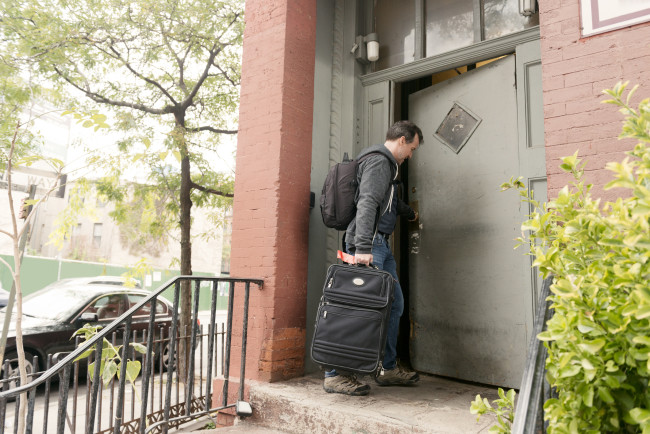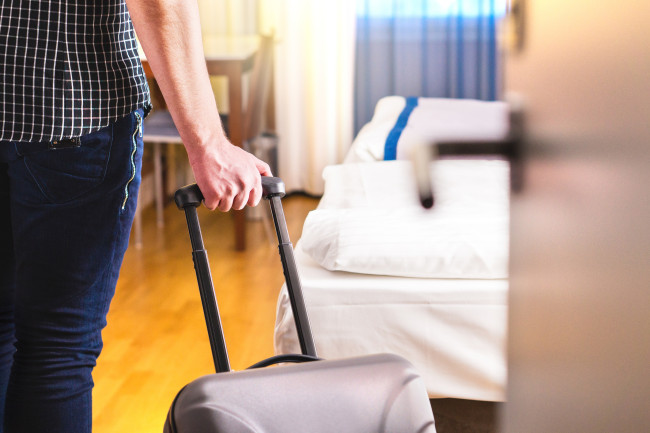To combat illegal short-term rentals, NYC requires hosts to register their listings. Here's how it works
- Depending on the host's settings, Airbnb listings without registration numbers will switch to 30-days or be deactivated
- Short-term rental sites like Airbnb, VRBO, and Booking.com can't process transactions without verifying registration status

Owners and boards who tell NYC that short-term rentals are not allowed in their building mean registration requests from these buildings will be denied.
iStock
Not long ago, two New York City renters checked out two different apartments at a rental building managed by DSA Property Group. Their applications were “rock solid,” says Arik Lifshitz, CEO of DSA Property Group. Both had good credit and money in the bank. They signed leases, but instead of moving in, the renters quickly listed the apartments on Airbnb, something the building does not permit.
The new renters clearly “never intended to live here,” Lifshitz says, even though “the lease and a separate rider makes it clear as day that short-term rentals are not allowed.”
When presented with the short-term rental listings, both tenants denied responsibility and refused to leave. One of them went as far as to claim it was the building that posted the listing to take over her place. Eventually she demanded $20,000 to leave, according to him. No dice, he says. The two sides are going to court, and he expects it will take several months plus thousands in legal fees to settle the case.
[Editor’s Note: A previous version of this article was published in December 2022. We are presenting it again with updated information for September 2023.]
Experiences like this have left Lifshitz jaded about the city’s efforts to rein in illegal Airbnbs. It’s an ongoing problem, he says. NYC is flooded with illegal short-term rentals, too many for the city to police. But he’s willing to participate in a new effort to block illegal short-term rentals, which launched in January 2022.
That’s because a new law, Local Law 18, now requires owners and renters to register their short-term rentals with the Mayor’s Office of Special Enforcement (OSE). Hosts get a registration number to display in listings. Sites such as Airbnb, VRBO, Booking.com, and others are prohibited from posting listings for unregistered short-term rentals.
Enforcement begins September 5th and Airbnb says listings without a registration number or exemption will be converted to long-term stays of 30 days if a host’s calendar settings permit them, otherwise the listing will be deactivated. In addition, existing Airbnb short-term reservations with check-in dates on or after December 2nd will be canceled and refunded.
What are the rules in NYC for short-term stays?
The new law does not change the existing rules for short-term rentals: Owners or renters cannot rent an entire apartment for fewer than 30 days, even if the host owns or lives in the building. Short-term rentals are only allowed if the host remains in the same unit as guests, and no more than two guests are permitted.
In addition, the new law does not allow short-term listings from renters or owners in rent-regulated buildings and NYCHA units are not permitted. The law also apply to one- and two-family houses.
Over 10,000 Airbnb listings for NYC short-term rentals "are likely to disappear" when the new rules go into effect, the Daily News reports, citing an estimate of nearly 40,000 total Airbnb listings in the city from Inside Airbnb, an independent watchdog group.
What is the new registration process for short-term rentals?
As part of the new law, when hosts register with the city, they must confirm that they are the owner or tenant through bank statements or utility bills, and that by offering a short-term rental they are not in violation of the lease or the laws governing short-term rentals, or zoning rules.
Owners will be required to provide lots of information about themselves and the unit, including their identity and their address, the full names of everyone who lives there, and a diagram of their property that shows which rooms will be used for the short-term rental and where the emergency exits are located. There will be a $145 non-refundable fee to process the application.
Both hosts and sites that fail to comply with the rules can be penalized. Fines for hosts could be as much as $5,000 and platforms could face penalties of $1,500. Enforcement of Local Law 18 fines begins September 5th.
What’s the goal of these new restrictions for short-term rentals?
These new registration rules “clarify short-term rental laws and lay out a straightforward process for hosts to obtain a registration for their legal rentals, as required by Local Law 18 of 2022,” said Christian Klossner, executive director of the Mayor’s Office of Special Enforcement, in a prior statement to the New York Post. His office regulates short-term rentals and will be overseeing the new registration system.
That article includes a response from Airbnb, which called the registration system “draconian and unworkable” and says it “will prevent lawful and responsible hosts from listing their homes at a time when New York families are navigating the rising cost of living.” Airbnb did not respond to a press query from Brick as of publication.
During a public comment period about the new law, some New Yorkers also complained about a potential loss of income. For example, low-income New Yorkers or those with disabilities said that home-sharing allows them to make ends meet, Thrillist reports.
To Ryan O’Connor, chief executive officer at Clinton Management, the property management affiliate of Douglaston Development, the new registration system creates responsibility and clarity.
“The unfortunate truth is the ones who suffer the most are small, multi-family buildings where the owners don’t always know that renters are putting their units on Airbnb, to the detriment of their neighbors,” O’Connor says.
Some of these short-term rentals are for rent-stabilized units, where tenants are paying below-market rents, he points out.
“I used to manage those walk ups; there’s no staff on site. Those buildings bear the brunt” of this problem, he says. “I suspect many property owners and residents will be in favor of clarifying who is staying in the building.”
How the new banned building list works
Another element of the law is a new list of buildings that prohibit short-term rentals.
Owners who tell OSE that short-term rentals are not allowed in their building mean registration requests from these buildings will be denied. Likewise, condo and co-op boards can also put their buildings on the prohibited list.
The new list appears likely to make it tougher for renters—like the ones Arik Lifshitz is dealing with—to be able to post illegal short-term listings. For example, if someone submits a short-term application, the OSE will notify the building owner of record, in effect giving building owners and boards an opportunity to confirm or block the request.
OSE is also expected to inform landlords and boards about how they can apply to get on the banned building list.
The origin of the new short-term rental law
The NYC Council passed the bill that created this registration system at the end of 2021. Former council member Ben Kallos was the lead sponsor of the bill, which is modeled on similar systems in San Francisco, Chicago, Portland, and Santa Monica.
According to a statement released by Kallos’ office at the time, “[m]ore than 37,000 NYC homes on Airbnb will have to be registered with the city thanks to the new law.”
Kallos pointed to the disconnect between empty NYC hotel rooms and the number of listings for entire homes (nearly 20,000), many of which may be illegal and exacerbate the affordable housing crisis, he said.
“Housing should be for New Yorkers. Hotels should be for tourists. We need every apartment being listed illegally on Airbnb back on the market to help our affordable housing crisis,” Kallos said.
You Might Also Like



























